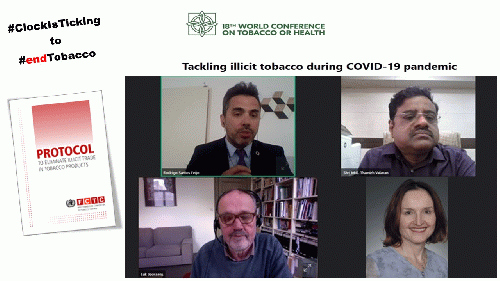
Every form of tobacco kills - ending illicit tobacco trade is one step towards ending all forms of tobacco use
(Image by CNS) Details DMCA
Ending tobacco use globally is not just a compelling public health imperative but is also key for social justice and corporate accountability. Let us not forget that each of the diseases caused by tobacco could have been prevented, and every tobacco-related death averted. Add to this that every health condition that increases the risk of serious outcomes of Covid-19, also has a common major risk factor - tobacco. With over 8 million deaths worldwide caused by tobacco every year, the writing on the wall is clear: if we are to deliver on sustainable development goals, then one of the essential milestones undoubtedly is to #endtobacco.
"Tobacco use being a manmade and industry-propelled epidemic is also entirely preventable, only if we put people and lives before profit. While elimination of illicit tobacco trade is an absolute imperative towards the #endtobacco agenda, we must always remember that tobacco, whether illicit or 'licit', kills. All forms of tobacco use kills" said Dr Tara Singh Bam, Asia Pacific Regional Director of the International Union Against Tuberculosis and Lung Disease (The Union).
global tobacco treaty and problem of illicit tobacco trade
According to the World Health Organization, the illicit tobacco trade poses a serious threat to public health because it increases access to often cheaper tobacco products, thus fuelling the tobacco epidemic and undermining tobacco control policies. It also causes substantial losses in government revenues and, at the same time, contributes to the funding of international criminal activities.
As the problem of illicit trade is global and beyond borders, it warrants a global well-coordinated effort for its elimination. Over 180 countries worldwide have ratified the legally binding global tobacco treaty (formally called the World Health Organization Framework Convention on Tobacco Control or FCTC) and are enforcing its lifesaving policies. This global tobacco treaty contains the world's most effective tobacco control and corporate accountability measures and is estimated to save more than 200 million lives by 2050 if fully implemented. Article 15 of this treaty gave the mandate to the governments to come together for the elimination of the illicit tobacco trade. That is why an international treaty (formally called the Protocol to Eliminate Illicit Trade in Tobacco Products) was adopted in 2012 (and entered into force in 2018) and is currently ratified by 62 countries worldwide, including India. Governments are obligated to bring their tracking and tracing systems (to eliminate illicit tobacco trade) into force by September 2023.
Luk Joossens, a board member of Smoke Free Partnership that envisions a world without tobacco, was on the Experts' Panel of a special virtual session "Tackling illicit tobacco during Covid-19 pandemic" hosted by the 2021 World Conference on Tobacco or Health (WCTOH) and International Union Against Tuberculosis and Lung Disease (The Union). He said that as the global economy has shrunk by 4.4% in 2020 due to the pandemic with a majority of countries in recession, eliminating the global illicit cigarette trade might help to raise the revenue for governments. Revenue losses due to illicit tobacco trade are for an estimated US$ 40.5 billion annually, and if the global illicit trade were to be eliminated, governments would gain at least US$ 31 billion. This could be part of Covid-19 recovery strategy, he said.
Listing some of the challenges in implementing the illicit trade protocol, Luk Joossens cautioned against tobacco industry's efforts to propose their own traceability system which they control. The global tobacco treaty's Article 5.3 obligates the governments to stop tobacco industry interference in public health policy as there is a direct, fundamental and irreconcilable conflict of interest between the industry and public health policy. Luk said that many governments in West Africa, which have ratified the global treaty to eliminate illicit tobacco trade, will struggle to implement it because of huge tobacco industry interference. "Big Tobacco is proposing a so-called 'easy to use' software to generate unique identifiers" said Luk. Moreover half of the countries that have ratified the global treaty to eliminate illicit tobacco trade are low and middle-income countries with lack of expertise and funding to establish a tracking and tracing system, he added.
Dr Hana Ross of Research Unit on the Economics of Excisable Products, University of Cape Town, South Africa, was also on the experts' panel. She said that although South Africa has not yet ratified the global treaty to eliminate illicit tobacco trade, it is making commendable progress towards addressing the issue. During the pandemic, South Africa had imposed a much longer sales ban - of almost 5 months - on tobacco products (from 27 March to 17 August 2020) compared to other countries like India where ban on sale of tobacco was imposed for only 6 weeks, or Botswana where the sale ban was there for 12 weeks. However, the benefit of sale ban gets punctured due to illicit tobacco trade in South Africa, where one-third of the tobacco market is estimated to be of illicit tobacco products.
(Note: You can view every article as one long page if you sign up as an Advocate Member, or higher).





